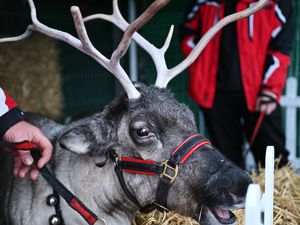Shropshire pet owners urged to keep regular exercise routine through winter
As a country of pet owners, we do our best to give our furry friends a life well loved. But following research from raw pet and wellbeing company, Bella+Duke has found that three quarters of pet owners don't know how to check if their pet is the right weight.

It's essential to ensure our beloved pets get the right amount and type of exercise to keep them healthy and happy. Appropriate exercise is crucial for maintaining their physical health, mental wellbeing, and overall quality of life.
Pets, like humans, need regular physical activity to stay fit. A lack of exercise can lead to obesity, behavioural issues, and various health problems. To help you keep your furry friends in top shape, expert dog behaviourist, Nikki Mather, has shared her top exercise tips:
- Tailor exercise to your pet's needs - Different pets have different exercise requirements, age, breed and overall health will dictate how much your pet can comfortably exercise. Research your pet’s breed to understand their specific exercise needs. High-energy breeds like Border Collies require more intense exercise, such as running, agility training or games to meet their strong instinctive needs such as herding, while a Shih Tzu might be content with a daily walk and some playtime.
- Regular walks - For dogs, daily walks are essential. They provide not only physical exercise but also mental stimulation as your dog encounters various sights, sounds, and smells. Aim for at least 30 minutes to an hour of walking per day, adjusting based on your dog's age, size, and breed, and try to mix up your walking route on occasion to keep things interesting for your dog.
- Interactive play - Engage your pets with interactive toys and games. For dogs, fetch, tug-of-war, scent-based games and puzzle toys can be great fun and effective enrichment activities that keep them mentally stimulated. Exercise isn’t just physical, mental stimulation is equally important. Teach your pet new tricks, provide puzzle feeders, or set up an obstacle course to challenge their minds. Mental exercise helps prevent boredom and destructive behaviour.
- Safe environment - Ensure your pet's exercise environment is safe, this can range from extreme temperatures, either hot or cold as well as torrential downpour and thunderstorms. Check that the area is free of hazards such as sharp objects or toxic plants. For outdoor activities, make sure your pet is protected against fleas, ticks, and other parasites.
- Hydration and rest - Always provide fresh water during and after exercise to keep your pet hydrated. Watch for signs of overexertion, such as excessive panting or limping, and adjust the exercise routine accordingly.
- Socialisation - Social interaction is crucial for pets, especially dogs. Regular playdates with other pets or visits to the dog park can provide both exercise and socialisation, helping your pet learn to interact well with others. Always be sure to understand your dog’s social preferences, as some dogs can be dog-selective and may not always want to engage with other dogs, especially in large groups.
- Consistency is key - Maintain a consistent exercise schedule. Pets thrive on routine, and regular exercise can help manage their energy levels and behaviour. Try to stick to a daily exercise routine to keep your pet happy and healthy.
Nikki says: "Exercise is just as essential for our pets’ health as it is our own. Daily walks don’t have to be repetitive, embark on new adventures, find new trails with new sights, smells and sounds and let your dog’s natural investigative instincts run wild. The most important part is to be consistent, without consistently making the effort to exercise your dog, you’ll never see the results you want."
By following these tips, you can ensure your furry friend stays fit, healthy, and happy. Regular exercise, tailored to your pet's specific needs, is the key to a long and joyful life together.




